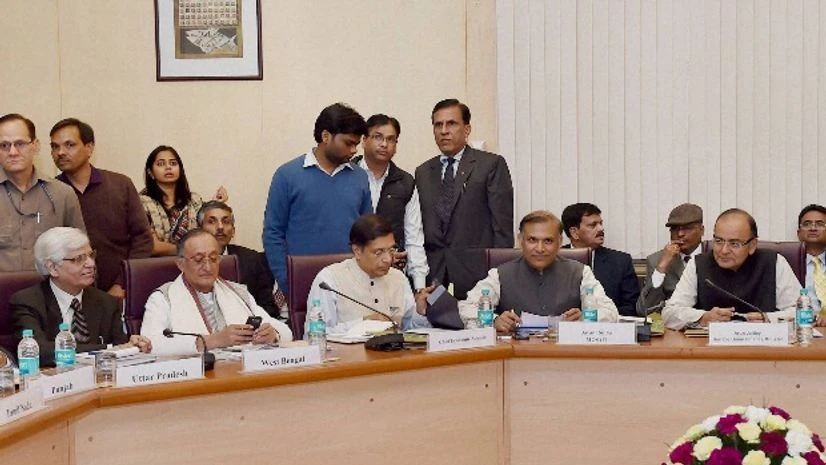The Centre's proposed goods and services tax (GST) saw resistance from states on Thursday, with the latter turning down the government's revised draft on a Constitution amendment Bill in this regard. However, the Centre exuded confidence that states would come on board, even as differences persisted between the two, particularly on the inclusion of petroleum products in GST.
The day saw hectic parleys - an empowered committee of state finance ministers met in the morning and, later, met Union Finance Minister Arun Jaitley for two hours. As consensus eluded the two sides, a small group of state finance ministers again met Jaitley and finance ministry officials for about two hours. Following the meeting, which went on till 9.30 pm, finance ministry officials claimed some breakthrough, adding they would try to present the Bill before Parliament in the current session.
Sources said the ministry offered to compensate states for any loss owing to GST, in any form they wanted. State finance ministers will again meet Jaitley and his team in a week.
More From This Section
States want petroleum and entry tax to be excluded from GST. They are also seeking five years worth of compensation for the revenue loss they will record after the new tax is introduced. However, the Centre has proposed to give them compensation for three years.
Also, the Centre included petroleum in the GST, but stipulated the rate on this be zero, so that the input credit chain wasn't broken.
States also wanted the entry tax imposed by municipalities in lieu of octroi to remain outside the GST ambit. However, in its revised draft, the Centre proposed this be subsumed within the GST.
On compensation, states sought this be included in the Bill so that the Centre would be bound to provide this. The Centre, however, did not do so.
"We were surprised to know the government hasn't agreed to the recommendations we made the last time, except one - putting IGST in the divisible pool," Rather, also the finance minister of Jammu & Kashmir, said.
On petroleum, entry tax and compensation, he said, "The Centre has not agreed to our recommendations."
Later in the evening, state finance ministers apprised Jaitley and other Union finance ministry officials about the deliberations they had carried out. After the meeting, Rather said, "You are going for the biggest tax reform in the country. So, it will not be advisable to go ahead without taking all states on board."
According to sources, Jaitley had said, "Our intention is not to make money at the cost of states. We have been discussing this issue for long. We should not miss the bus now."
The second meeting with Jaitley was attended by a smaller group - of the state finance ministers, only Rather, along with the finance ministers of Gujarat and Punjab attended.
Amid these meetings, Jaitley went to the Prime Minister's Office for a while, to participate in a meeting with Prime Minister Narendra Modi and US economists.
After the last meeting of the day, Rather said, "We have made headway and will meet in a week."
Union finance ministry officials, however, refused to accept states' demand of keeping petroleum products out of the GST ambit completely.
When asked whether the constitutional amendment Bill would be tabled in this session, finance ministry officials said, "We will try our best, though it seems difficult." They added primarily, Maharashtra and Gujarat had some issues with GST, as these have large manufacturing sectors. A state finance minister said only one Opposition-ruled state favoured the constitutional amendment Bill in its current form.
To woo states, Jaitley had assured them they would be given Rs 11,000 crore this year as compensation for the loss in revenue, resulting from a cut in central sales tax (CST). This tax was cut from four per cent to two per cent in phases, after state-level value-added tax (VAT) was introduced on April 1, 2005. CST is a tax imposed on inter-state movement of goods; it isn't consistent with VAT or GST.
Rather welcomed this decision. "As far as CST compensation is concerned, we are happy to know the Centre has agreed to keep a provision of Rs 11,000 crore in the current year's Budget. That will settle the claim of CST compensation up to the year 2010-11," he said, adding the matter of compensation for subsequent years would be discussed with Jaitley.
After the two previous finance ministers refusing to release CST compensation till states extended cooperation on the GST front, Jaitley promised to clear the dues, totalling about Rs 30,000 crore, through three years.
The roll-out of the GST has missed several deadlines because states have failed to reach consensus on crucial issues. The new tax regime, originally scheduled to be implemented on April 1, 2010, might not be implemented before April 1, 2016 even if the constitutional amendment Bill is tabled in the current session of Parliament.
A LONG ROAD
- Constitution amendment Bill is required to be passed with two-thirds majority in both Houses of Parliament
- Ruling NDA has only 59 seats in the 243-member Rajya Sabha
- Two-thirds majority means approval of 162 members, if none is absent
- Besides, the Bill will have to be ratified by at least half of India's states
- NDA is ruling in 10 states
- Some more states might have NDA govts after the ongoing elections
- However, composition of RS won't change much before early 2016
- For majority in the Upper House, the NDA will have to wait till 2018
- Even if the Bill is tabled in this session of Parliament, GST might not come up before 2016-17
- This is so because after passage of this Bill, Centre will have to bring its own Bill and model GST Bill
- States will bring their own GST Bills and get them passed in Assemblies

)
